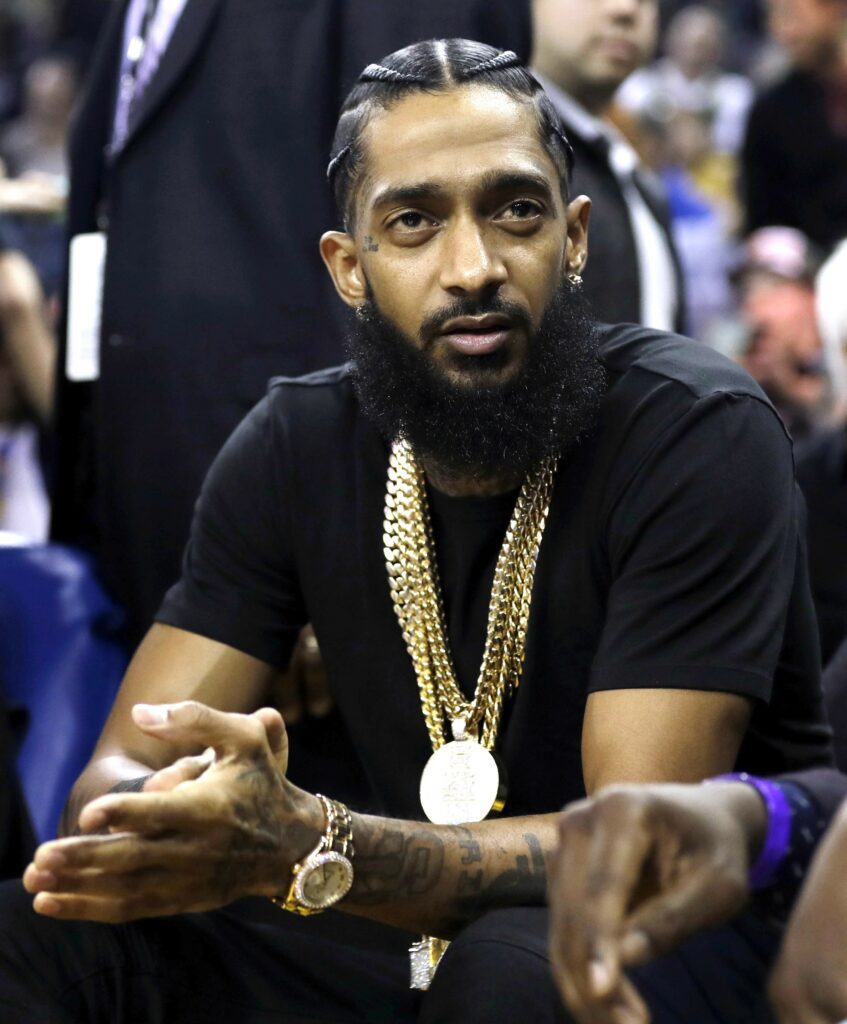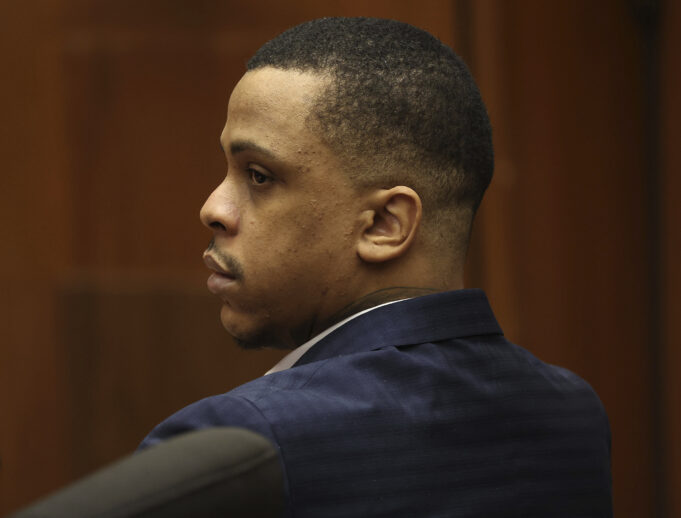LOS ANGELES—A judge issued a warrant for an eyewitness to the shooting death of rapper Nipsey Hussle for failing to appear to testify at the trial of the man charged in the slaying, and in his absence a police detective testified on the reluctance of witnesses that has marked the case.
Evan “Rimpau” MacKenzie, a close friend of Nipsey’s (born Ermias Ashgedom), a pallbearer at his funeral and was standing next to him when he was shot, has repeatedly ignored subpoenas ordering him to appear and testify for the prosecution, resulting in Judge H. Clay Jacke II issuing the bench warrant with $500,000 bail on June 23 at the conclusion of the second week of trial.

“Mr. Mackenzie, did he express a reluctance to testify?” Aaron Jansen, attorney for defendant Eric Holder, asked Los Angeles police Detective Cedric Washington, who answered that Mr. MacKenzie had said as much in phone conversations.
The taboo against “snitching” has pervaded every part of the trial of Mr. Holder, who is charged with first-degree murder in the 2019 death of Nipsey and with attempted murder because two bystanders were struck with gunfire.
It was a conversation between Holder and Nipsey on the subject—in which the artist and businessman told Mr. Holder there were rumors of “paperwork” suggesting he’d been talking to authorities—that prosecutors peg as Mr. Holder’s motive for returning minutes later to gun Nipsey down.
The shooting took place in a predominately Black South Los Angeles neighborhood where both men and most of the witnesses grew up, and where mistrust of police and courts runs deep. Even Nipsey’s friends and fans, and people hit by Mr. Holder’s gunfire, have been reluctant to talk in the public venue.
“I don’t know nothing, don’t see nothing,” Kerry Lathan, who was wounded in the shooting, said on the stand during the trial’s opening week. He refused to identify himself in surveillance video that was played for jurors. He then declined to identify Mr. Holder as the shooter.
“You don’t want to testify about what happened?” Deputy District Attorney John McKinney asked him. “That’s right,” Mr. Lathan replied.
On June 23, Atty. Jansen sought to pin the hesitancy on Mr. Holder and Nipsey’s ties to the Rollin’ 60s street gang. “Typically in gang cases is there a reluctance to testify?” Atty. Jansen asked. “I wouldn’t limit it to gang cases,” Det. Washington replied.
“I’m asking about gang cases,” Atty. Jansen said. “I do believe it is common, yes,” Det. Washington said.
Atty. Jansen continued, “Several witnesses in this case have said they did not want to come to court, and they felt that their families would be in danger, right?” Det. Washington conceded that there were.
In follow-up questions from prosecutors, Det. Washington downplayed the gang aspect.
“I’ve investigated many cases that are outside of the scope of gang cases. I’ve found that a majority of people are reluctant to come to court or talk to law enforcement,” Det. Washington said. “Everybody seems to think that from coming to court, they are going to be subject to retaliation.”
“Has there been any threat to any witness in this case that accused them of snitching?” Atty. McKinney asked. “Do you know of any harm that came to anyone in this case for being a witness or talking to police?”
Det. Washington said no to both questions, acknowledging there was a threat made by an anonymous caller to Bryannita Nicholson, who testified for the prosecution that she had acted as Mr. Holder’s unwitting getaway driver.
Ms. Nicholson, who was given immunity in exchange for her testimony, had her identity kept secret when she testified before a grand jury in 2019.
During the trial’s first week, after her identity was revealed but before she took the stand, she received the phone call.
“A male voice was heard saying something to the effect that ‘You had Nipsey Hussle killed,’” Det. Washington said. “Bryannita hung up.” Det. McKinney emphasized that the threat was not about her testifying, but about her role in Nipsey’s death.
Ms. Nicholson was given extra security and was escorted through a special entrance for her two days of testimony in which she appeared to speak freely and confidently, showing no reluctance.
An attorney for Mr. Holder pressed her over errors in the testimony she gave for the prosecution, asking on June 21 whether she was lying or merely mistaken. She testified the day before that she had no idea Mr. Holder knew Nipsey.
Others witnesses have been far more hesitant and tight-lipped on the stand, though several eyewitnesses have identified Mr. Holder as the shooter, making it unlikely the absence and silence of other witnesses will do much damage to a powerful prosecution case.
The defense has acknowledged that Holder shot Nipsey but says there was no premeditation and he is not guilty of first-degree murder.
Prosecutors have just one more witness before they rest their case, and the jury could have it soon. “Unless Rimpau gets picked up,” Atty. McKinney said after court.
Nipsey, a 33-year-old father of two, had just been nominated for a Grammy for his major-label-debut album after years of underground acclaim when he was killed.
(Compiled from Associated Press reports.)













